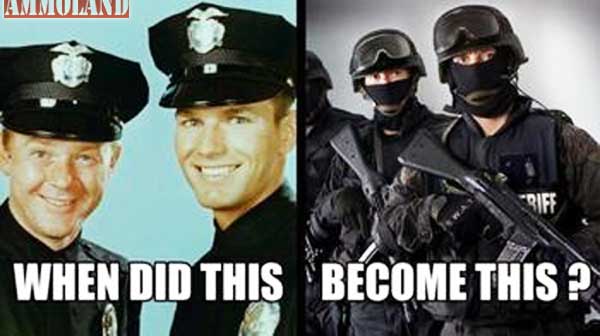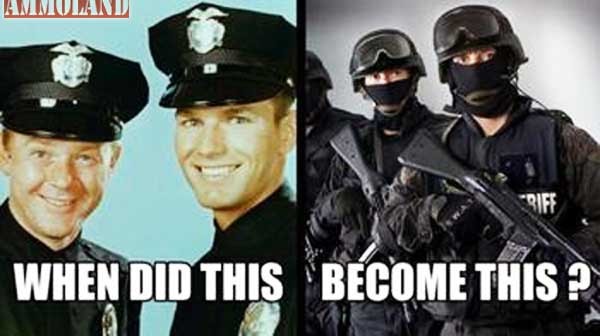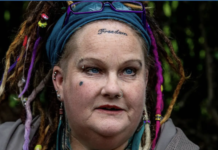There’s something odd going on in the New Zealand Police at the moment. They know they’ve been caught out – and highly publicly, too.
This, in and of itself, is not entirely out of the ordinary. In a string of instances ranging from last summer’s “zero tolerance” speed limit policing through to much earlier (and arguably more dangerous) issues around their chopper-borne Rambo-raids of Kim DotCom’s mansion … they’ve found themselves to be exposed.
But whereas in those instances the Police and the politicians were able to attempt to deflect criticism by presenting a united front and claiming things were ‘off limits’ due to being “an operational matter”, this is different.
Caught out in what noted criminologist Dr Jarrod Gilbert quite rightly states to be a move whose “intent [and] language would have impressed George Orwell”, both the police and the politicians are blaming each other.
What’s happened, is the Police have started rolling out “research contracts” which academics using police data apparently have to sign. If the Police don’t like what you write, these contracts give them the power to veto you publishing – or, at the very least, to work with you to “improve its outcomes” [i.e. make them sound less “negative”].
Don’t abide by their conditions? You’ll find yourself “blacklisted”, and unable to access any further police data – which, as Dr Gilbert points out, is kinda a crippling restriction if you’re a research-academic specializing in criminology or policing matters.
So why are these somewhat draconian (because dragons are all about guarding and hoarding secrets) restrictions in place.
Well, according to the Minister of Police, it’s an “operational matter”.
But if you listen to Police Association chief Greg O’Connor, the policy’s in place to ensure information disclosures by the Police don’t “embarrass government”.
That doesn’t necessarily mean, as Green Party Police Spokesman David Clendon put it, that the “Minister sets policy which police then implement”. It’s entirely plausible given O’Connor’s wording about Police commissioners being “[just as] answerable to Ministers as any other CEO in the public sector” (itself a worrying neoliberalist creep/infiltration of corporate terms) that the policy is actually something that’s been cooked up in-house and run with the tacit approval of the Police’s political managers – rather than being a Woodhouse-authored directive that Police are simply all too happy to carry out.
Either way, there’s a culture of secrecy and standoffishiness within the Police that’s aided and abetted by their blue-wearing friends in high places. Just remember the furore from former Minister of Police Judith Collins castigating critics of the police … and, for that matter, the rest of the justice system … for *daring* to hold Police to account and insist they actually follow the law when carrying out undercover operations (rather than, say, mercilessly forging court documents). In that instance, politicians protected police from embarrassment. Or at least, attempted to.
To witness this “special relationship” in action going the other way, look no further than the time Judith Collins protected Police over – proven – allegations that they’d manipulated crime statistics in order to make themselves and their political paymasters look good.
It was a relationship that benefited everybody (except, of course, for the poor long-suffering public and victims of crime). The Government got to trumpet claims that it had presided over and contributed to a drop in crime. The police got to say they were doing their jobs and meeting public service sector performance targets better than before.
So naturally, when concerns were raised that the Police’s efforts and crime stats might in fact have proven to be illusory, the relevant Minister decided not to look into claims the stats had been manipulated lest the Government find things they didn’t like.
Starting to get the picture here?
There is very much a two-way relationship between the New Zealand Police and the New Zealand National Party. They each work together to cover each other’s backs and to make the other partner look good. They’ve got it down to such a fine art that they don’t even necessarily need to sotto-voce instruct one another to make this happen. When something happens that might embarrass the Police, certain parts of the Government will step in or look the other way to ensure it doesn’t untowardly scandalize them (or, heaven forbid, actually provide serious impetus for change). Equally, when the Police turn up something that might take some of the luster out of the Government’s sails, they’ll deliberately hide, lie and obfuscate in order to make sure the “right” outcomes come out for their pals. Not necessarily as an organization, mind – occasionally as isolated individuals or as small-scale units … but the effect is all the same.
So I think we can all agree that some serious questions need to start being asked about the nature and extent of the obvious “special relationship” between the Police and the National Party.
Unfortunately, any such untoward collusion will be very difficult to prove – as Police Association President Greg O’Connor warns, they’ll have taken serious pains to ensure the relevant information will be well “hidden” from public scrutiny.







National supporters made the same litany of complaints against the Police when Labour were in power, around Helen Clarks motorcade, faked signature etc. So to suggest they are biased towards a political party is inaccurate, biased towards the government of the day would be a more apt statement.
If the police have grounds to believe that gilbert is either working for or with the gangs, therefore comprising his position, it stands to reason why they wouldn’t go out of their way to provide him with additional information that he couldn’t otherwise obtain under the Official Information Act.
Except for one thing, Jollo. There is zero evidence that Gilbert “is either working for or with the gangs” any more than there is evidence that you are a PR staffer working for Police hierarchy out of 180 Molesworth St, in Wellington.
Conversely how on earth do you know there is zero evidence?
The only way to find out would be for Gilbert to do what everyone else does and appeal his privacy act request to the ombudsman who would then be able to decide. And that decision can then be appealed further.
The grounds for withholding information are all available online and they are very limiting.
The curious thing is why isn’t he doing this instead of going straight to the media?
Because no one has provided it.
Ah, the old “Why Doesn’t He Do XYZ” criticism…
Fact is, Jollo, that going to the media is often the last resort, when all other avenues have been closed off. Something you’d be aware of, if you had similar dealings with government ministers, ministries, departments, agencies, etc. Going public is not as easy as you seem to think it is, and has consequences in itself.
Just be thankful that we have whistleblowers who are willing to go public on these problems, instead of maintaining silence…
There are enough people willing to maintain silence in the face of governmental/bureaucratic mis-use of power and information.
There’s plenty of evidence that the police associate with criminals. They interact with gangs on almost a daily basis.
I guess that nobody should cooperate with the police.
Is that right Jono?
So you expect the Police to breach the privacy act themselves and publicly release all the confidential information they hold on Gilbert and the reasons why they withheld it?
The only person who can release that, and appeal to the ombudsman is Gilbert, so why hasn’t he?
From reading the contract it appears that researchers are given access to confidential police data, systems and information. It would seem obvious that you would have to pass a vetting test before you are giving access to that information.
*If*the police have solid grounds that he is comprised by his links to organised crime groups do you still expect them to put him in a position where he can access information on those gangs?
It appears that Police Commissioner Bush has accepted that their policy in this area has been unacceptable. According to his comments on ‘The Nation” this morning;
Ref: http://www.scoop.co.nz/stories/PO1511/S00456/lisa-owen-interviews-police-commissioner-mike-bush.htm
Despite trying to ‘spin’ the restricted access to data as “privacy issues”, the Police Commissioner has recognised that Police practice of trying to control the flow of information, and more specifically, how it is used, in this area is untenable.
Excusing it as “privacy concerns” doesn’t wash because I doubt if Police have been releasing personally-identifiable data in the past to other academics. And if they have – well, that’s a whole new can of worms ready to open up.
There is still no evidence to support that assertion.
If it was true, it is up to the Police to prove it with solid evidence.
Not only have they failed to do so, but today Commissioner Mike Bush has backed down on their policy.
That indicates that Police accept the fault lay with their policy, not Mr Gilbert.
I think incentivising crime fighting is a mistake. The war on drugs is also disproportionately funded for political reasons. And it presupposes what individual police are talented at.
The thing is with NZ police is its one big monolith covering the whole country. That means if training fails in one part of the country, every one has to be retrained to the same standard under one unified command, and out of one academy No crime is homogenous through out the country so training every one to the same standards or improving skills means low end crime gets disproportionately targeted.
My view of police is that it has become a function of money. That is the mistake because there is no economic components to policing. There mission objectives don’t generate revenue.
No one pays heros to come and rescue them. Heros just do
I know some policemen and they are a decent lot but are worried at being used as a political ramrod as political pressure has come down for NZ Police to engage in many more issues than they used to cover so they are being used, as part of Government policy now, by this corrupt Government.
In my view, police people are just young keint’s lucky to find a job in this economy.
The issue for me is police get given new stuff to do, but no money to do it.
I wonder how the investigation is going with regards to the hacking of the Labour Party website, they moved very quickly on Whale Slater’s website when it got hacked?
Good question we have heard bugger all on that eh.
More of the obfuscation maybe.
How’s it going bringing and progressing charges against a prominent politician, to whom the John Key-oil had given unequivocal support? Mind you NBR “On Breakfast, Mr Key praised Mr S****, saying he was a very good local MP who would well have gone on to become a minister.”
Seems the police are selective in which cases they ‘Rambo up’ on (ie those that are anti-Nat, like Dotcom and Whale-oil), and those they prevaricate and re-arrange the deck-chairs on.
It didn’t get hacked. They left the front door open so that anyone could rummage through your underwear
In effect they posted a public database.
Incompetence.
Andrew, I think you’ll find that wandering into someone else’s house to “rummage through [their] underwear” is still considered trespassing at least, or breaking and entering at worst.
Put it to the test, if you wish, and see what charges are laid against you. Let us know how you get on (and when Mt Eden visiting hours are).
Curwen – excellent analysis. There definitely doers seem to be an unnaturally close relationship between National and the Police.
Criminologist Dr Jarrod Gilbert’s situation should be real cause for concern when a government agency – especially with coercive powers such as the NZ Police – can withhold information on the flimsiest of reasons.
One more step to an Orwellian nightmare of a Police State.
excuse the music placed in background, its wont change the facts of Key ordered Political arrest to impose gag orders at election time.
https://www.youtube.com/watch?v=xdZe5UfKYv8
More indepth on this:https://www.youtube.com/watch?v=vOP4Qb3mLu8
They are a terrorist goup with little regard to the NZ laws here. The GCSB and SIS need a hell alot of training If they think they a World class Security. The solo mother in her own with five kids has prove to be World Class with intelligence. Yah just smile and wave boys. Ffs..John Key get out of our way so we can make history together without you.
Heard a story last week that the Police were instructed by a National Government MP ex Minister of Justice to rig crime statistics in South Auckland to make the National Government look good.
I think it has got to the point that a lot of people have given up ringing the Police these days on minor crime matters as the Police do not have the resources to investigate and they are concentrating on major investigations such as Whaleoil’s Website Hacking and the Mt Eden Teapot Tapes.
[…] Which is a distinct possibility recently raised by another blogger, Curwen Rolinson; […]
[…] Which is a distinct possibility recently raised by another blogger, Curwen Rolinson; […]
Comments are closed.